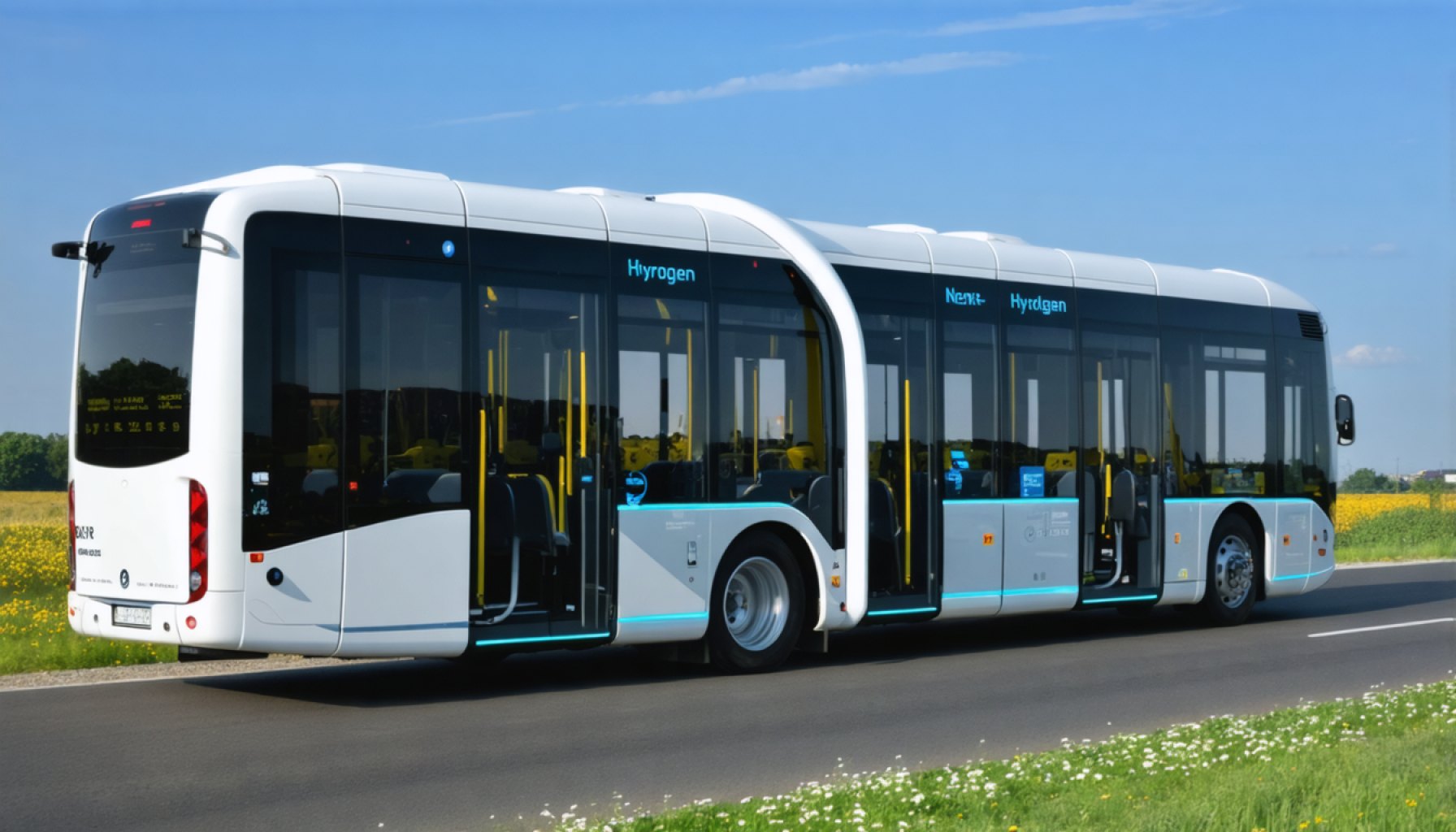- Hexagon Purus, a leader in zero-emission technology, is revolutionizing urban transportation with its advanced hydrogen fuel storage systems.
- The company has partnered with MCV to supply these systems for hydrogen fuel-cell electric buses in Europe, marking a EUR 2.4 million milestone deal.
- This collaboration represents Hexagon Purus’s first venture in Europe, aiming to transform public transport with eco-friendly solutions.
- Manufactured in Kassel, Germany, these hydrogen storage systems are pivotal in advancing cleaner urban transit.
- As the popularity of fuel-cell and electric buses rises, Hexagon Purus is leading the charge towards sustainable cities with reduced emissions.
- The partnership not only aims to influence Europe but sets a precedent for global efforts toward carbon neutrality.
- Michael Kleschinski, Executive Vice President at Hexagon Purus, envisions a future where innovative technology aligns with environmental goals to improve city living.
Amid the bustling hum of urban life, a quiet revolution in clean transportation is gaining momentum—one that promises to reshape our cities and air quality for generations to come. At the forefront stands Hexagon Purus, a trailblazer in zero-emission technology, which has secured a ground-breaking order set to energize Europe’s public transport landscape.
This pivotal collaboration with MCV, a notable influencer in the Middle-Eastern and African bus market, marks Hexagon Purus’s inaugural foray with its next-generation hydrogen fuel storage systems tailored for the continent’s greener future. Worth a notable EUR 2.4 million, this partnership extends beyond mere transaction, venturing into a transformative alliance poised to redefine bus travel with an eco-friendly edge.
Manufactured with precision and innovation at Hexagon Purus’s state-of-the-art facility in Kassel, Germany, the hydrogen storage systems are not just components—in them, the vigorous pulse of a cleaner tomorrow beat. MCV’s deployment of these systems within hydrogen fuel-cell electric buses will soon navigate European roads, with potential ripple effects across global markets aiming for carbon neutrality.
As fuel-cell and electric buses gain traction in urban planning, Michael Kleschinski, Executive Vice President at Hexagon Purus, paints a dynamic vision. Leading this hydrogen mobility charge, Kleschinski embodies the zeitgeist of modern, sustainable transit solutions. His optimism and the company’s strategic momentum are indicators of how technology can harmonize with nature to cut through the carbon dense urban air.
The scenery of tomorrow’s cities, accentuated by lower emissions and quieter, smoother rides, draws closer to today’s reality with every innovation. Hexagon Purus and MCV are not just changing buses—they are chiseling a roadmap for others to follow toward a carbon-free horizon. This alliance isn’t merely a step forward; it’s a leap towards a sustainable promise enlivened on the busy, beating hearts of European streets.
Hydrogen Buses: The Eco-Friendly Revolution Transforming Urban Commutes
The quiet yet significant shift towards hydrogen-powered public transport is gaining traction, marked by the pivotal partnership between Hexagon Purus and MCV. This alliance is reshaping the potential of urban transportation, turning Europe’s city streets into strategic zones for green technology advancement. Here’s a closer look at the implications, benefits, and challenges of this revolutionary move toward hydrogen fuel-cell electric buses.
Understanding Hydrogen Fuel-Cell Electric Buses
Hydrogen fuel-cell buses are powered by hydrogen gas, which is stored in high-pressure tanks and converted into electricity via fuel cells, producing only water vapor as a byproduct. This technology promises significant reductions in greenhouse gas emissions, playing a crucial role in global initiatives to combat climate change.
Advantages of Hydrogen Buses
1. Environmentally Friendly:
– Zero emission of carbon dioxide during operation.
– Reduced noise pollution compared to traditional buses.
2. Range and Efficiency:
– Longer range than battery-electric buses, with refueling processes similar time-wise to diesel buses.
– Enhanced energy efficiency due to regenerative braking systems.
3. Versatility:
– Suitable for various climates and geographical terrains.
– Capable of maintaining operation in colder conditions compared to battery-operated counterparts.
Potential Market Impact
According to a report by IEA, by 2050, hydrogen technology could meet 18% of the world’s total energy demand. This growth is mirrored in the transportation sector, with hydrogen buses poised to play a crucial role. Their deployment could potentially spearhead the evolution of the public transportation infrastructure, reducing reliance on fossil fuels.
Challenges and Limitations
1. Infrastructure Development:
– Establishing hydrogen fueling stations is capital-intensive.
– Requires extensive research and planning for an efficient rollout.
2. Cost Factors:
– Although prices for fuel cell systems have decreased, the initial investment remains higher than conventional diesel buses.
3. Technological Advancements:
– Continued advancements are needed to enhance hydrogen storage solutions and fuel cell longevity.
Real-World Applications and Insights
Cities like Hamburg and Rotterdam are already trialing hydrogen buses successfully. Their experiences indicate the necessity of robust partnerships between local governments, technology providers, and transit operators to ensure smooth implementation and operation.
Actionable Steps For Cities
1. Collaborative Networks:
– Foster ties between manufacturers, cities, and energy providers to streamline infrastructure development.
2. Policy Support:
– Governments should incentivize private sector involvement through subsidies and tax breaks.
3. Public Engagement:
– Educate communities on the benefits of hydrogen technology to build public support and acceptance.
Conclusion: The Path Forward
The Hexagon Purus and MCV collaboration underlines an undeniable truth: hydrogen technology is on the brink of revolutionizing urban mobility. This leap toward cleaner transport solutions emphasizes the importance of investing in sustainable infrastructure today, thus ensuring a greener, more sustainable tomorrow. Embracing and supporting such innovations will be key for cities across Europe and beyond.
For more insights into sustainable transport solutions and global energy trends, visit U.S. Department of Transportation.
